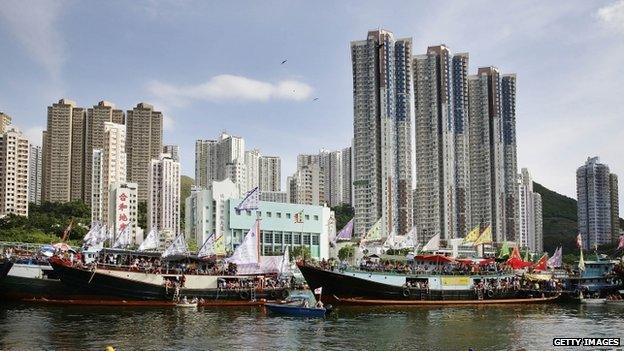Hong Kong's democracy debate
- Published
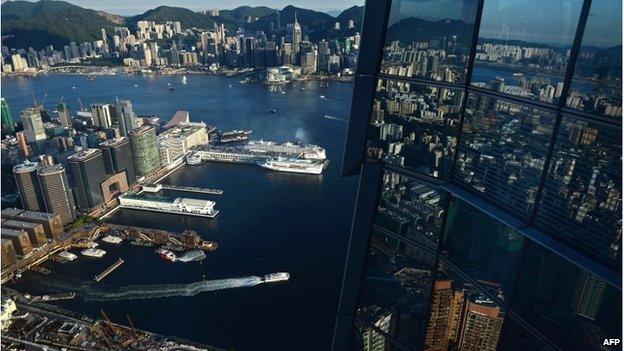
Hong Kong has its own legal system, with rights such as freedom of assembly and free speech protected
Hong Kong legislators have rejected a reform package that would have allowed direct elections for the territory's leader in 2017. The reforms were endorsed by the Chinese government, but many in Hong Kong are opposed to it.
There were huge street protests and blockades last year, when Beijing ruled out open nominations for the election of Hong Kong's chief executive in 2017.
The BBC takes a look at the controversy.
What is Hong Kong's relationship with China?
Hong Kong, a former British colony, was handed back to China in 1997 following a 1984 agreement, external between China and Britain.
China agreed to govern Hong Kong under the principle of "one country, two systems", where the city would enjoy "a high degree of autonomy, except in foreign and defence affairs" for 50 years.
As a result, Hong Kong has its own legal system, and rights including freedom of assembly and free speech are protected.
Its leader, the chief executive, is currently elected by a 1,200-member election committee. A majority of the representatives are viewed as pro-Beijing.
Hong Kong's mini-constitution, the Basic Law, external, says that "the ultimate aim" is to elect the chief executive "by universal suffrage upon nomination by a broadly representative nominating committee in accordance with democratic procedures".

What are the reforms about?
The Chinese government promised direct elections for chief executive by 2017.
But in August 2014 China's top legislative committee ruled, external that voters would only be able to choose from a list of two or three candidates selected by a nominating committee.
This committee would be formed "in accordance with" Hong Kong's largely pro-Beijing election committee. Any candidate would have to secure the support of more than 50% of the nominating committee before being able to run in the election.
Democracy activists argue that this gives China the ability to screen out any candidates it disapproves of.
Hong Kong's government put together an electoral reform package based on Beijing's ruling.
But pro-democracy legislators vetoed the bill, which requires the support of two-thirds of the 70-seat legislature to pass.

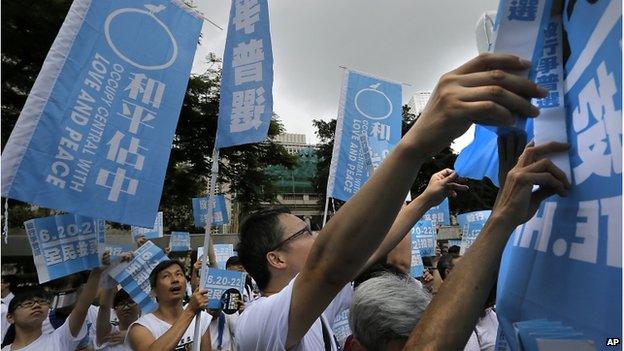
Occupy Central is one of several pro-democracy groups pushing for electoral reform in Hong Kong
What do democracy activists say?
They have dubbed the proposed new system a "sham democracy".
Prominent pro-democracy groups include Occupy Central, external, led by academic Benny Tai, and student groups such as the Hong Kong Federation of Students and Scholarism.
Occupy Central organised an unofficial referendum, external on political reform in June 2014. About one in five Hong Kong residents turned out for it - and 88% of participants said the legislative council should veto any political reform package that did not satisfy international standards and allow a genuine choice for voters.
Shortly after the vote, tens of thousands of protesters took part in what observers say was Hong Kong's largest pro-democracy rally in a decade on 1 July, which marked the day Hong Kong was returned to China in 1997.
Since then, the student groups have become a key player as well.
In late September they led a week of class boycotts, which later grew into full-scale city-wide protests - dubbed the Umbrella Movement - when Occupy Central decided to join in.
Tens of thousands camped in the streets for weeks, holding their ground despite clashes with police. But in late November and December the protests petered out - the camps were gradually dismantled by police.
Despite talks between the students and high-level officials, the protests ended with no concessions from government.

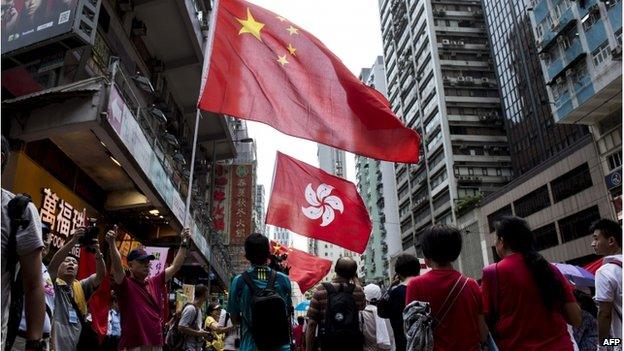
A rally by pro-Beijing groups on 17 August drew thousands
Does everyone want full democracy?
No. Pro-Beijing groups, such as Silent Majority for Hong Kong, external and Caring Hong Kong Power, external have emerged, criticising pro-democracy activists for "endangering" the city.
They argue that continued civil disobedience and opposition to Beijing would only damage the city's reputation and economy, as well as its relationship with China.
These groups have organised several protests against Occupy Central and the pro-democracy movement.
Such large-scale pro-government protests are rare in Hong Kong, and some questioned their legitimacy, especially when reports emerged that some marchers were paid to attend.
Business leaders, who favour stability, have also opposed pro-democracy protests.
Pro-China legislators have argued, external that Beijing's proposals are an improvement on the current system.
Several groups have rallied against the pro-democracy protests. In November, police arrested a number of people involved in scuffles with pro-democracy protesters camped in the streets, and said that among those arrested were people with links to triad gangs.
Some of the public who previously backed the sentiment of the Occupy Central protests also turned against it, because of the disruption caused by the ongoing sit-ins in central areas and streets. A number of businesses sought court injunctions to have the roads cleared.

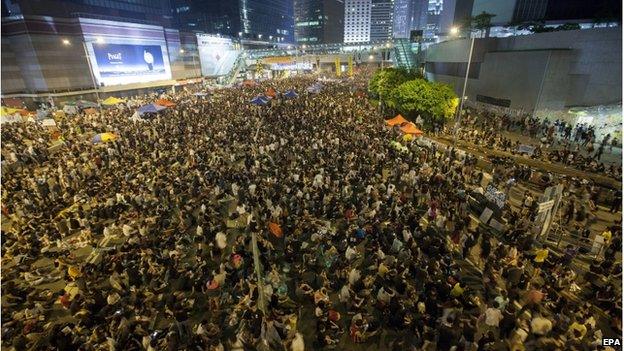
China has denounced the street protests that took place in early October as "illegal"
What does China say?
China has consistently denounced pro-democracy protests, and called last year's street occupations "illegal".
On 16 June, the deputy commissioner for Beijing's foreign affairs office in Hong Kong denounced the "despicable means" and "extremely violent activities" of opposition activists.
"We hope that the moderate pan-democrats will see through the true face of radical forces," Song Ruan was quoted as saying by the AFP news agency, ahead of the vote on the reform package.
In a June 2014 white paper, external, China said some had a "confused and lopsided" understanding of the "one country, two systems" model.
China has constantly stressed that unity is the way forward for the country, as it grapples with demands for greater autonomy in Xinjiang and Tibet.

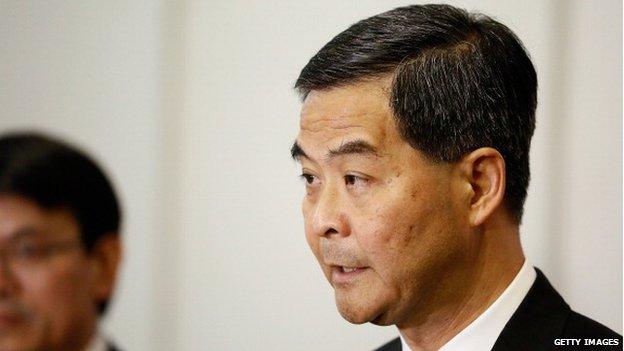
The current chief executive of Hong Kong is Leung Chun-ying
What is the Hong Kong government's stand?
Chief Executive CY Leung hailed Beijing's decision on election candidacy as a "major step forward in the development of Hong Kong's society".
His government said June's unofficial referendum had no legal standing.
It also welcomed the Chinese government's white paper, saying that Hong Kong has benefited from the "one country, two systems" model.
- Published15 July 2014
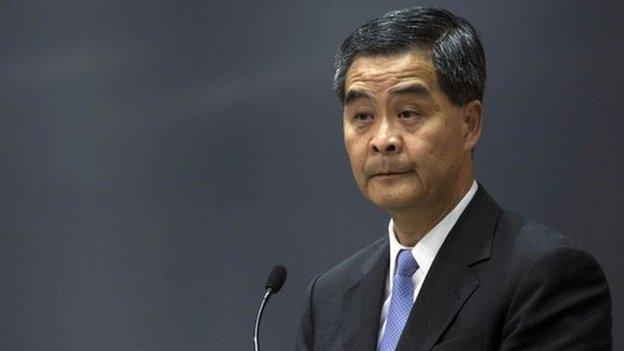
- Published17 August 2014
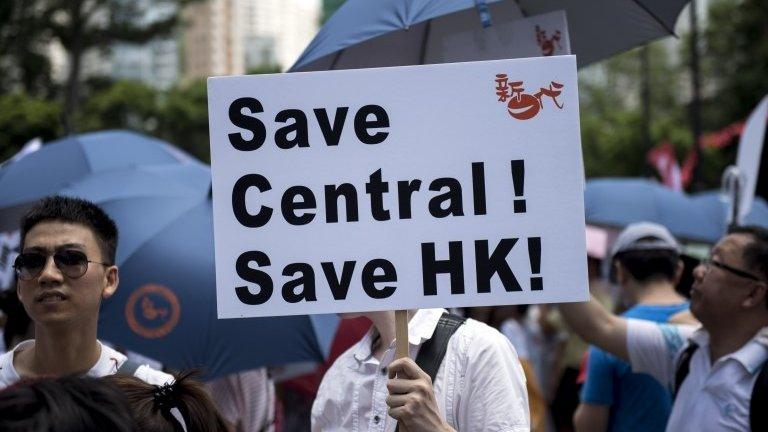
- Published2 July 2014
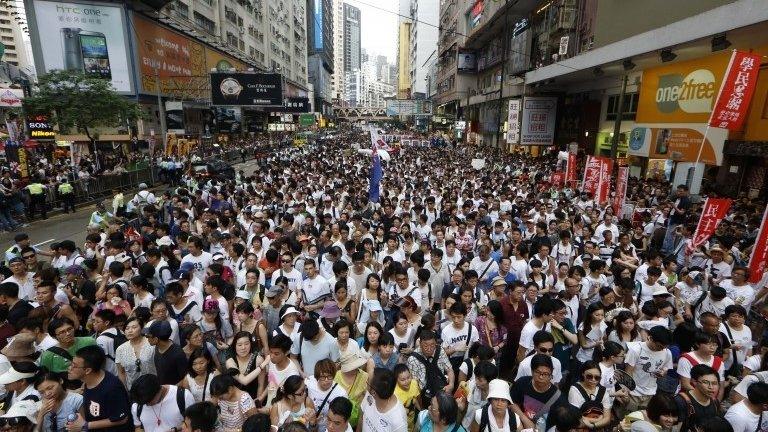
- Published30 June 2014
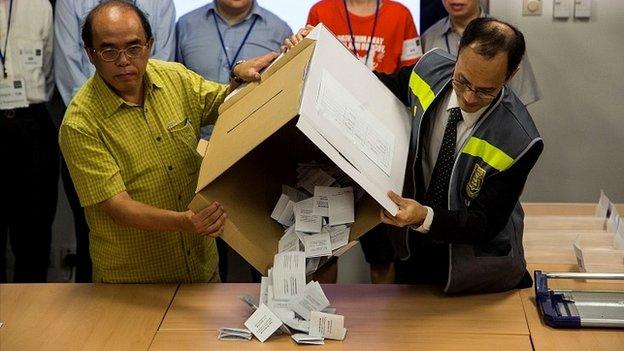
- Published11 June 2014
